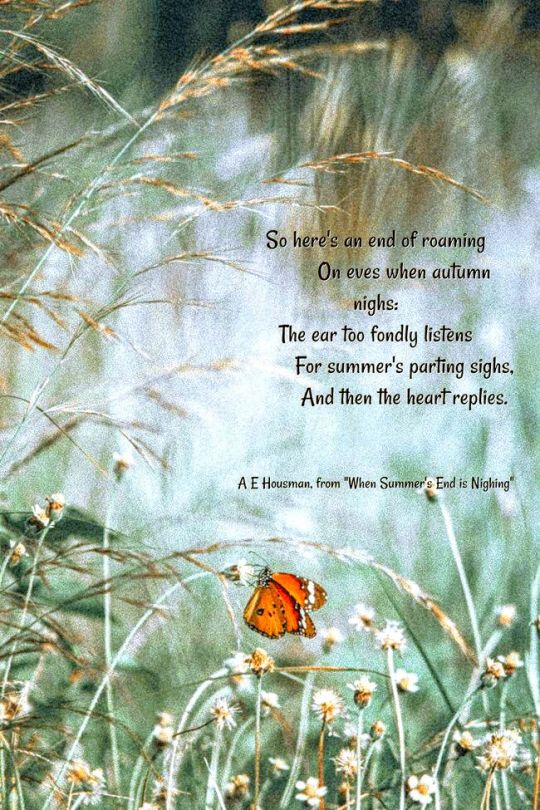#a e housman
Text


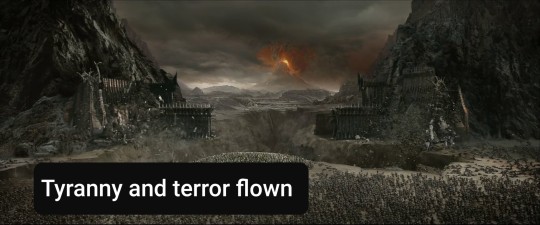
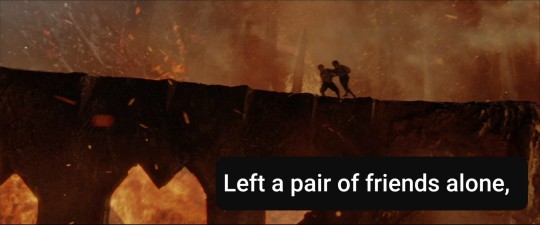

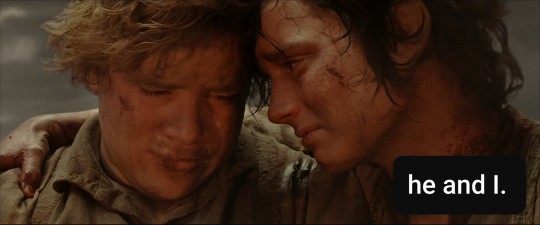
a. e. housman, from 'hell gate'
#back on my bullshit!! here's more housman poetry that makes me howl loudly about lotr!#if you havent read the full poem of hell gate you should. go read it. it genuinely ruins me#mostly bc so much of a e 'morbid secretions' housman poetry is sad but this one has such a kernel of hope in it#not unmixed but like. it's one of the only instances of him imagining a happy gay ending and it's such a powerful one#go to hell for being gay but your boyfriend is there already and he shoots the literal devil with a gun and WINS and you walk out together#lotr#samfrodo#samfro#a e housman#gay belligerence#lotr anthology#described in alt text
6K notes
·
View notes
Text

So here's an end of roaming
On eves when autumn nighs:
The ear too fondly listens
For summer's parting sighs,
And then the heart replies.
81 notes
·
View notes
Photo

A. E. Housman (deceased)
Gender: Male
Sexuality: Gay
DOB: 26 March 1859
RIP: 30 April 1936
Ethnicity: White - English
Occupation: Scholar, poet
#A. E. Housman#A E Housman#lgbt history#homosexuality#lgbt#male#gay#1859#rip#historical#white#scholar#poet
64 notes
·
View notes
Photo

A. E. Housman’s translation of Horace’s Ode Diffugere Nives, in More Poems (1936)
“During my time at Cambridge, I attended [Housman's] lectures for two years. At five minutes past 11 he used to walk to the desk, open his manuscript, and begin to read. At the end of the hour he folded his papers and left the room. He never looked either at us or at the row of dons in the front. One morning in May, 1914, when the trees in Cambridge were covered with blossom, he reached in his lecture Ode 7 in Horace's Fourth Book, 'Diffugere nives, redeunt iam gramina campis.' This ode he dissected with the usual display of brilliance, wit, and sarcasm.
Then for the first time in two years he looked up at us, and in quite a different voice said: 'I should like to spend the last few minutes considering this ode simply as poetry.' Our previous experience of Professor Housman would have made us sure that he would regard such a proceeding as beneath contempt. He read the ode aloud with deep emotion, first in Latin and then in an English translation of his own. 'That,' he said hurriedly, almost like a man betraying a secret, 'I regard as the most beautiful poem in ancient literature,' and walked quickly out of the room.
A scholar of Trinity (since killed in the War), who walked with me to our next lecture, expressed in undergraduate style our feeling that we had seen something not really meant for us. 'I felt quite uncomfortable,' he said. 'I was afraid the old fellow was going to cry.'”
qtd in Richard Perceval Graves, A. E. Housman: The Scholar Poet (1972)
459 notes
·
View notes
Text
Shall I compare thee to a summer’s day?
This became a pretty long post, sorry.
I noticed something that I haven't seen before in Kirk/Spock analysis, so I'd like to talk about it. As I said other times, I'm aware that Star Trek fans in over half a century have probably already written everything about the most popular ship, but that's not going to stop me from adding my own words. :)
What I want to talk about is in the episode Whom Gods Destroy. I feel like this episode is pretty underrated among K/S shippers. Nowadays, it might be because of this part:
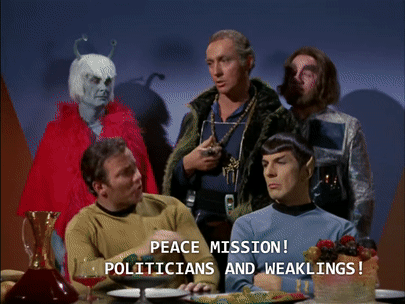
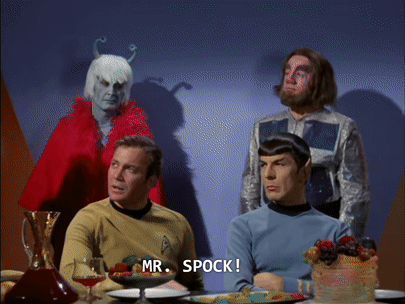
"Kirk and Spock call each other brothers, this episode tries to no-homo them!"
Short answer: No, it doesn't.
Long answer: This is not what I actually want to focus on, but I understand that it's important, so I'll try to give an explanation. When we watch TOS, we always need to remember when it was made. I know it's not easy (trust me, I made that mistake too), but unfortunately we can't forget that, in the '60s, homosexuality was still considered a mental illness (if not worse, depending on the people/country), and portraying it in a positive way in a mainstream American show was NOT an option. At the time, it wasn't uncommon for queer people to call each other "brothers/sisters" as a socially acceptable way to say "we love each other", "we're each other's most important person", "we have something special that is different from friendship".
Does it mean Kirk and Spock say "brothers" when they mean "lovers"? Not necessarily, of course, but we need to remember that, unlike contemporary shows where two men can actually claim to be brothers to mean "we're close but not gay", in the past it could have meant "we're close and maybe also gay". I'm not saying it's canon, but the interpretation is valid.
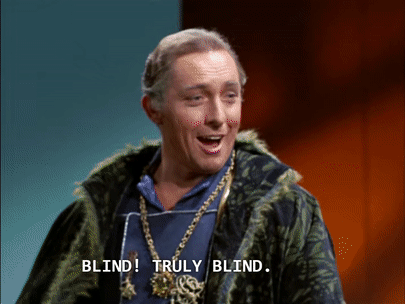
As you can see, Garth strongly disagrees with Kirk and Spock when they say they're brothers. :D Unfortunately, it's from the wrong reason: he's claiming that they only have a captain-first officer relationship, without feelings involved. And the episode definitely wants us to think that he's wrong! Kirk and Spock love each other! They have very special feelings for each other, feelings that the word "friendship" wouldn't completely convey. I choose to interpret their "brotherhood" in that positive way, also keeping in mind that Spock does say Kirk is speaking "somewhat figuratively", so he's aware they're not actual adopted siblings. :)
Of course, I can't forget to add what every K/S fan knows: if we consider Roddenberry's novel canon (or at least canonically relevant to a degree), Vulcans use the same word, t'hy'la, to say "friend", "brother", "lover" or a combination of at least two of them. That just makes everything easy! Every time Kirk and Spock call each other "friends" or "brothers" in canon, we can just assume they mean t'hy'la. Checkmate! :D
Okay, back to Whom Gods Destroy. If that episode isn't as "no homo" as we initially thought, what makes it so good for K/S shippers to the point that I'm writing a long post about it? Well, a couple of things. The first one happens before the "brothers" speech, and it's this:
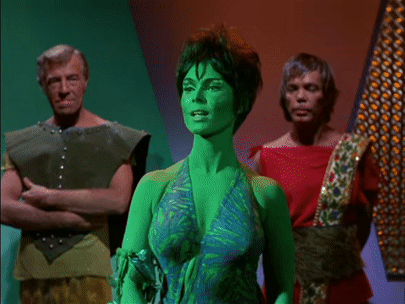
In context, Marta claims to write poetry, so she recites one of "her" poems… which is very obviously Shakespeare. Star Trek writers chose one of the most famous English sonnets of all time on purpose, and it's clear because they made 100% sure every single person watching the episode wouldn't miss it:



So, okay, she didn't write it. We got it. It's Star Trek and its Shakespeare references, nothing new.
Is that all? Hm, I'm not sure. Because Shakespeare's sonnet 18 might be extremely famous, but it's not the only famous poem Shakespeare wrote. And even if it was, since the characters were going to point out that "hey that's Shakespeare" anyway, why did Star Trek writers chose that sonnet specifically? Why did they choose one of the sonnets Shakespeare wrote for another man, to express his beauty? To express his love for him?
Shall I compare thee to a summer’s day?
Thou art more lovely and more temperate.
Rough winds do shake the darling buds of May,
And summer’s lease hath all too short a date.
Sometime too hot the eye of heaven shines,
And often is his gold complexion dimmed;
And every fair from fair sometime declines,
By chance, or nature’s changing course, untrimmed;
But thy eternal summer shall not fade,
Nor lose possession of that fair thou ow’st,
Nor shall death brag thou wand'rest in his shade,
When in eternal lines to Time thou grow'st.
So long as men can breathe, or eyes can see,
So long lives this, and this gives life to thee.
They could have chosen one of the sonnets Shakespeare wrote for a woman. There are a lot more! But no, Marta quotes a love poem by a man for another man, and the camera shows us this:

Just two bros, sitting together, listening to Shakespeare's words about a young man's beauty 'cause they're not gay.
Now… I know, I know. Even nowadays, Shakespeare is too famous to be universally accepted as queer. There's always going to be academics who think "those sonnets were platonic!"; at the time Star Trek was made, I wouldn't be surprised if almost everyone thought "Shall I compare thee to a summer’s day?" was about either platonic love or love for a woman (the latter used to be a theory too, but it was proved wrong). On the other hand, the queer reading has also been discussed for centuries, and supported by famous academics too, like Oscar Wilde. So even in this case, we can't really know what Star Trek writers had in mind. Did they just pick the most popular sonnet without thinking too hard? Did they try to add gay subtext to the scene? Well, it certainly looks gay to me. :)
And now, the best part! What, you thought it was over? Nope, I said I was going to talk about "a couple of things", and Shakespeare was just the first one. Because if you think that his sonnet was probably not meant to be gay in context, and after that Kirk and Spock call each other brothers, and that's also not gay in your opinion… well, maybe we can add a little more fuel to the potential gay subtext.

So, what is Marta doing here? Quoting poetry again.
Right after their conversation about brotherhood and the loyalty of a crew, Garth gets mad at Spock ("Remove this animal!"); Garth's men bring Spock away, and Garth asks Kirk the password to get to the Enterprise. He tells Kirk that he'll make him beg for death. That's when Marta suddenly starts reciting another poem. This time, though, there's a big difference from the first one: the audience can tell it's probably another reference because of her previous behavior, but it's hard to recognize. It's not Shakespeare. It's not even the most popular poem by that author, and she's also quoting it a little wrong.
This is a subtle reference. The average Star Trek fan doesn't know what it is. I also didn't. So, of course, I got curious, and this is what I found:
A. E. Housman, English poet (1859 – 1936)
XIX.
In midnights of November,
When Dead Man’s Fair is nigh,
And danger in the valley,
And anger in the sky,
Around the huddling homesteads
The leafless timber roars,
And the dead call the dying
And finger at the doors.
Oh, yonder faltering fingers
Are hands I used to hold;
Their false companion drowses
And leaves them in the cold.
Oh, to the bed of ocean,
To Africk and to Ind,
I will arise and follow
Along the rainy wind.
The night goes out and under
With all its train forlorn;
Hues in the east assemble
And cocks crow up the morn.
The living are the living
And dead the dead will stay,
And I will sort with comrades
That face the beam of day.

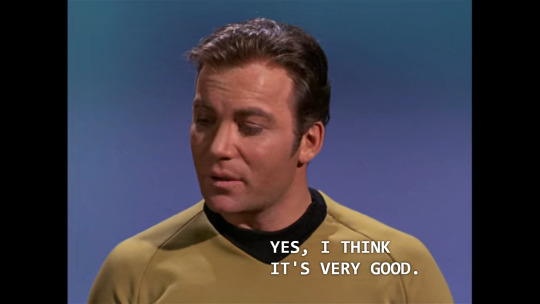
Alfred Edward Housman is another English poet, but very different from William Shakespeare: he lived just a few decades before Star Trek was made. Why choosing him? Maybe because he wrote a lot about men dying during a war, and it's relevant because Garth killed a lot of people and wants to bring war to the galaxy. We will probably never know, but after a little research, I realized that Housman is definitely an interesting-- no, a fascinating choice.
As I said before, the poem Marta recites doesn't look like one of Housman's most popular works, and it's hard to find something specific about it online. It doesn't even have a title, that "XIX" simply means that it's the 19th poem in the volume it's part of. So what is so fascinating about it? Well…
The title of the volume is "Last Poems". I didn't use Wikipedia as my only source, but in this case, I think it can explain context better than me:
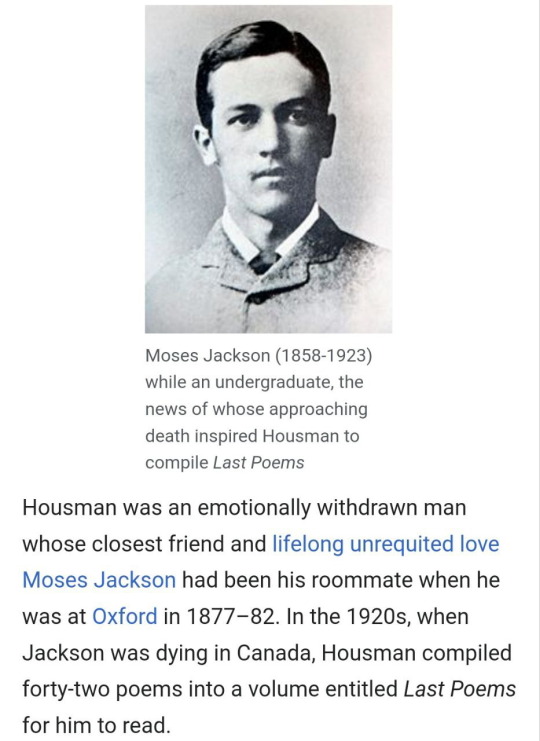
OH.
So the poem Marta is quoting in front of Kirk, the poem she wants to know if Kirk likes, is not just a poem about death: it's part of a volume a man wrote for the man he was in love with.
Wait, again? There are two poems in this episode, and both of them are by male authors who wrote them for the man they loved? That doesn't really look like a coincidence anymore.
It's subtle, for sure, especially the second one. The average person watching the episode probably doesn't recognize Housman, doesn't know anything about his life. The average person in front of their TV sees Marta trying to seduce Kirk right after "her" poem, so everything looks heterosexual, right?

Yeah, that's what it looks like. But it's the surface, nothing more.
Because unlike Shakespeare, I didn't find discourse about Housman's sexual orientation: there were probably rumors about his homosexuality when he was alive as well, and after his death, it wasn't really a mystery. A Housman reader, even in the 60s, probably knew.
So, yes, this episode has two poems. Two poets that in different times wrote for a man they loved. Could it be that Whom Gods Destroy is also, at least partially, about love between two men? Well, I basically already said it when I talked about the "brothers" conversation, but let's think about it again. Except for the last few minutes, Kirk and Spock are the only two characters from the main cast on that planet. There's another man, Dr. Cory, who knows Kirk. Kirk seems to care about him… but not enough to risk something while the doctor is tortured in front of his eyes. Also, Dr. Cory isn't present when Marta quotes the poems. The first time, Kirk and Spock are together, and the second time happens not long after this scene:
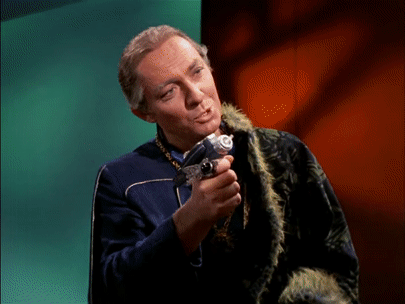
They try to make Kirk like the girl, but does he really care?
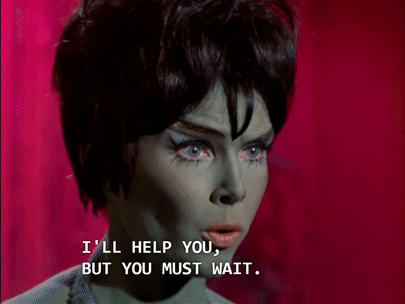
Nope, he just wants Spock back.
They are "brothers (somewhat figuratively)" who trust each other deeply, and even if their enemies try to distract Kirk, it's obvious what he really wants.
It's him and Spock. Spock and… him?
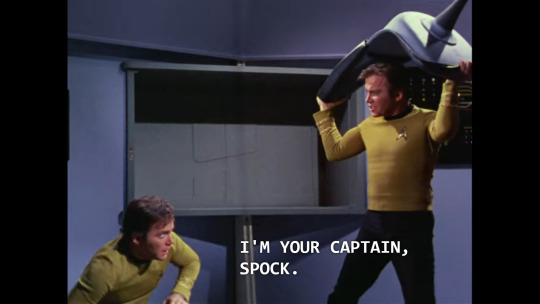
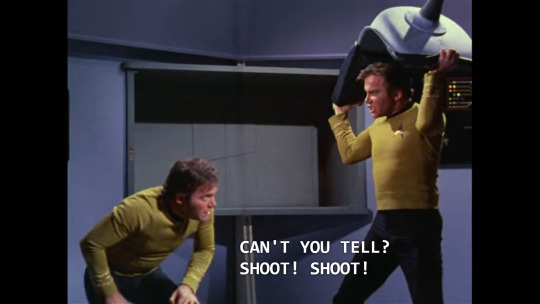
Hmm...
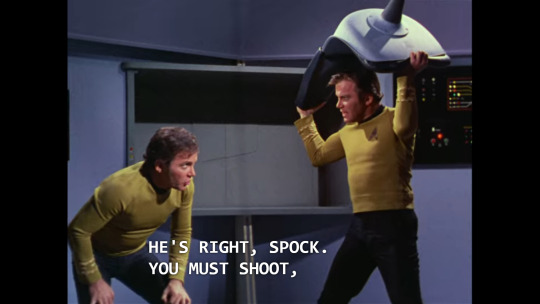
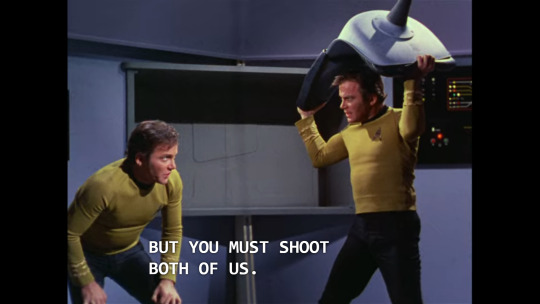
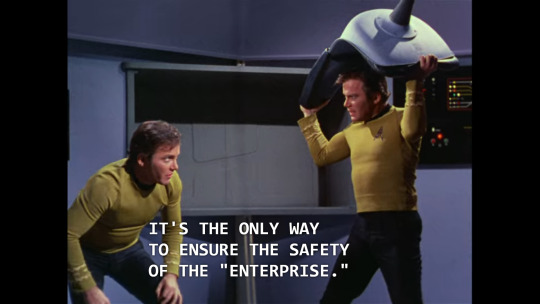

Okay, that's better. :D
At this point of the series, they're so close that Kirk doesn't even consider the possibility that Spock might not recognize him immediately.

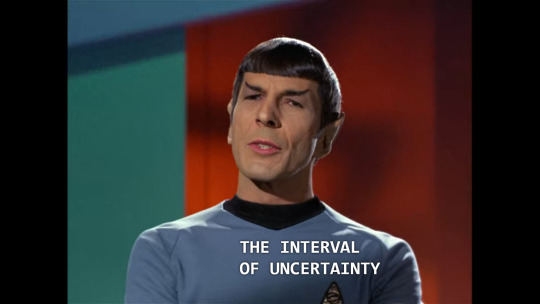
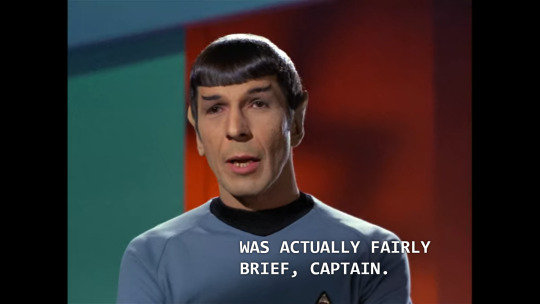
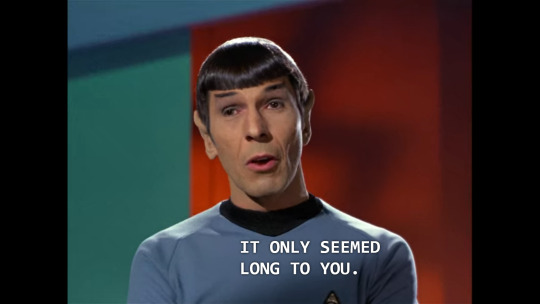
Luckily, none of them dies and their feelings are mutual, so they can be happier than Housman. Maybe they'll read his poems together. Or Shakespeare, that's always an option.
[Pictures from s3 e14 - Whom Gods Destroy]
#spirk#k/s#kirk x spock#star trek tos#star trek the original series#spock#james t. kirk#tos spirk#william shakespeare#a e housman#I'm sorry I wrote so much#well no I'm not really sorry but thank you for reading until the end#my gifs
211 notes
·
View notes
Text
A Shropshire Lad, XL
Into my heart an air that kills
From yon far country blows:
What are those blue remembered hills,
What spires, what farms are those?
That is the land of lost content,
I see it shining plain,
The happy highways where I went
And cannot come again.
— A. E. Housman
16 notes
·
View notes
Text
Ten of Our Favorite Poems for National Poetry Month!
April was National Poetry Month, and to celebrate we asked authors involved with Duck Prints Press to talk about their favorite (ideally queer) poems! For the poems in the public domain, we then recorded them and shared them on Instagram and/or Tiktok!
Join us, and get your poem on, with these ten lovely pieces!
To a Stranger by Walt Whitman
read by Nina Waters (Tiktok | Instagram)
-
At a Dinner Party by Amy Levy
read by Maggie Page (Tiktok | Instagram)
-
Halfway Down by A. A. Milne
read by Tris Lawrence (Tiktok | Instagram)
-
Because I Liked You Better by A. E. Housman
read by Maggie Page (Instagram)
-
Bored: At A London Music by Horatio Brown
read by Maggie Page (Tiktok | Instagram)
-
The Road Not Taken by Robert Frost
read by Tris Lawrence (Tiktok | Instagram)
-
Endymion by Oscar Wilde
read by Nina Waters (Tiktok | Instagram)
-
The Chariot by Emily Dickinson
read by Tris Lawrence (Instagram)
-
Love Stronger than Death by Agnes Mary Frances Robinson
read by Maggie Page (Instagram)
-
Apologia by Oscar Wilde
read by Maggie Page (Instagram)
-
Honorable Mention: We couldn’t include “Stop All the Clocks” by W. H. Auden or “I Know a Man” by Robert Creeley because they’re not in the public domain, but they absolutely would have been included if we could have.
-
What are YOUR favorite queer historical poems and/or poets? Tell us in the replies!
(if you send something our way that’s in the public domain, maybe we’ll record it!)
Who We Are: Duck Prints Press LLC is an independent publisher based in New York State. Our founding vision is to help fan creators publishing their original works. We are particularly dedicated to working with queer authors and publishing stories featuring characters from across the LGBTQIA+ spectrum. Want to always hear the latest? Sign up for our monthly newsletter! Want to support the Press, read about us behind-the-scenes, learn what’s coming down the pipeline, get exclusive teasers, and claim free stories? Back us on Patreon monthly!
#duck prints press#national poetry month#oscar wilde#emily dickinson#robert frost#aa milne#amy levy#walt whitman#agnes mary frances robinson#horatio brown#a e housman
30 notes
·
View notes
Text
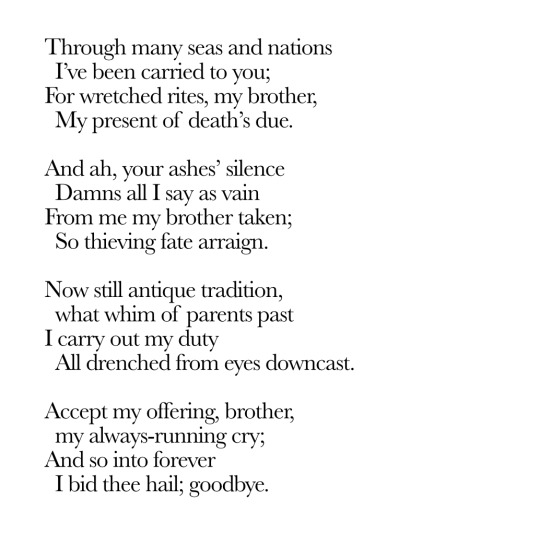
CATULLUS101 (in the style of A E housman)
i like to think about catullus and housman as a scholar of latin poetry and i’m not the first (i.e. tom stoppard’s the invention of love) - though the most (only?) recorded interaction of housman with catullus is a correction of a comma in 64, and considering his temperament i can see why he preferred horace, for example
but i love the intertextuality you can find between them - that housman-esque solemn tenderness you can find in 101 in particular, housman’s preoccupation with early death…if he ever translated catullus i bet it would have been real good, but here’s my approximation: in loose iambic trimeter (à la with rue my heart is laden, there pass the careless people, much of housman’s poetry), rhymed but not too far from catullus in content :-}
[Transcript:
Through many seas and nations
I’ve been carried to you;
For wretched rites, my brother,
My present of death’s due.
/
And ah, your ashes’ silence
Damns all I say as vain
From me my brother taken;
So thieving fate arraign.
/
Now still antique tradition,
what whim of parents past
I carry out my duty
All drenched from eyes downcast.
/
Accept my offering, brother,
my always-running cry;
And so into forever
I bid thee hail; goodbye.]
96 notes
·
View notes
Text
Poem of the Day 8 January 2024
A Shropshire Lad 35: On the idle hill of summer BY A. E. HOUSMAN
On the idle hill of summer,
Sleepy with the flow of streams,
Far I hear the steady drummer
Drumming like a noise in dreams.
Far and near and low and louder
On the roads of earth go by,
Dear to friends and food for powder,
Soldiers marching, all to die.
East and west on fields forgotten
Bleach the bones of comrades slain,
Lovely lads and dead and rotten;
None that go return again.
Far the calling bugles hollo,
High the screaming fife replies,
Gay the files of scarlet follow:
Woman bore me, I will rise.
2 notes
·
View notes
Text
A poem by A. E. Housman

Tarry, delight, so seldom met
Tarry, delight, so seldom met,
So sure to perish, tarry still;
Forbear to cease or languish yet,
Though soon you must and will.
By Sestos town, in Hero’s tower,
On Hero’s heart Leander lies;
The signal torch has burned its hour
And sputters as it dies.
Beneath him, in the nighted firth,
Between two continents complain
The seas he swam from earth to earth
And he must swim again.

A. E. Housman
(1859-1936)
Image: Hero and Leander (c.1625-1626) by Nicolas Regnier
3 notes
·
View notes
Text
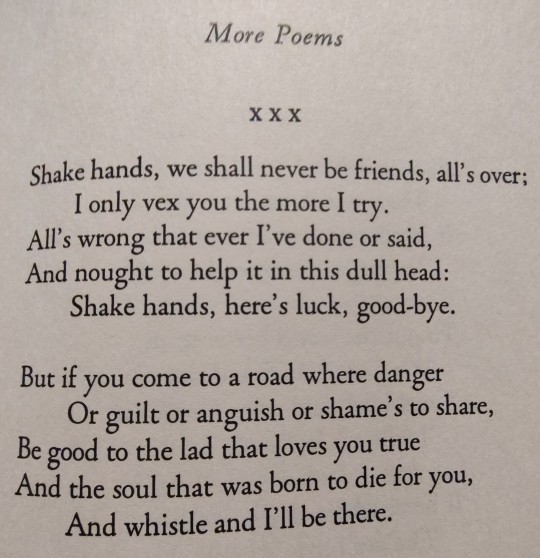
the fact that a. e. housman wrote this poem almost a hundred years ago and somehow, today, managed to catapult me directly back into my deranged slushpile of emotion re: a certain side character in a certain gay thai mafia series is impressive in its testament to the everlasting power of literature yet more than a little concerning in its reflection upon my mental state. anyways. yeah this is about big
#kinnporsche the series#kinnporsche big#kinn x big#kinn anakinn theerapanyakul#kinn anakinn#a e housman#i have absolutely no excuse for this. it simply sprang fully formed from my mind#á la athena from zeus's forehead#and i felt compelled to inflict it upon the world#sorry everybody i'm afraid i'm back on my kinnbig bullshit#but you know what? what else is new huh#somebody put me the entire fuck to sleep
26 notes
·
View notes
Text
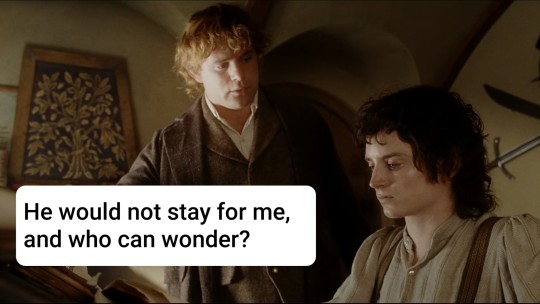



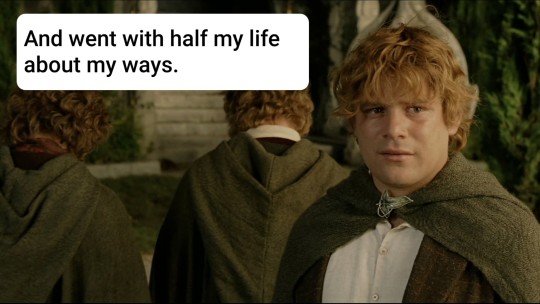
a. e. housman, 'he would not stay for me, and who can wonder'
#me getting ready to post this: oh haz is going to be in agonies over this one#this is badly edited because i made it on my phone at midnight but i had to get it out of my brain immediately#lotr#samfrodo#a e housman#ive decided im entering a new era in which i post all the samfrodo poems that live in my head and torment me unceasingly. so watch out#gay belligerence#described in alt text#lotr anthology
325 notes
·
View notes
Text
Now you will not swell the rout
Of lads that wore their honours out,
Runners whom renown outran
And the name died before the man.
from "To an Athlete Dying Young" by A. E. Housman
2 notes
·
View notes
Text

Oh, When I Was In Love With You ~ A. E. Housman
#alliwanttodoiscollectpoetry#poem#poems#poetry#poet#anthology#poetry blog#literature#love#tumblr poetry#a e housman#oh#when I was in love with you#lad#poem of the day#tumblr poem
12 notes
·
View notes
Text
To a Brother Gone Too Soon
Some flowers do not grow to bloom.
As buds, they wilt a season soon.
But trampled buds, I still suppose,
Do wither quicker than the rose.
There’s little to be talked about,
With no honours to be worn out.
Just wonderings of what might have been
If other days were let begin.
You never breathed the open air,
Pure sunlight never stroked your hair.
A little life so cruelly cut.
So many doors so quickly shut.
If only you had had a chance,
Who knows what steps you would have danced?
But memories are just question marks
When life was barely let to start.
You would have been the fifth in line,
And today you would be nine.
The songbirds seem to call your name,
Our tearful hymns echoed the same.
Our kitchen was a bleak display
Lined with sympathy bouquets.
The vases all held baby’s breath
And all wished you a peaceful rest.
There is some tragic irony
That that is what they’d gift to thee:
More breaths to fill your tiny lungs.
I plucked the smallest bud. So young.
Written (a few years back) in the poetic form of “To an Athlete Dying Young” by A. E. Housman as an elegy for my brother. Happy birthday, Joshua.
3 notes
·
View notes
